Human Food That You Can Feed Your Dog
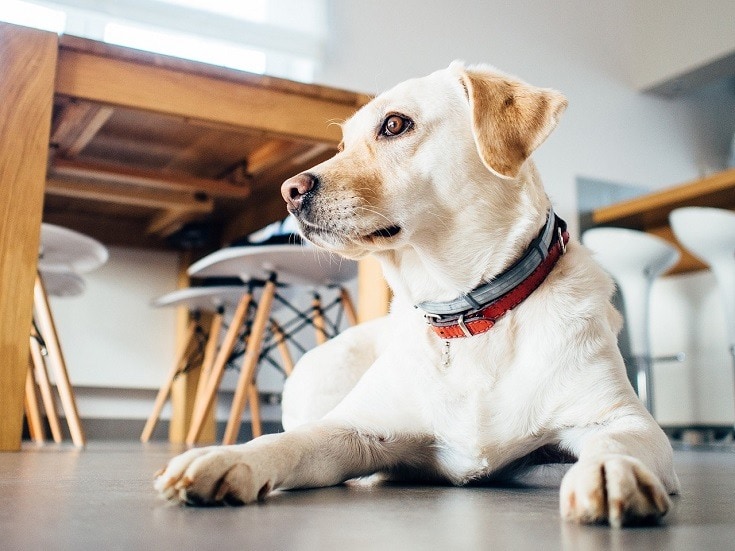
It's one of the simple joys of owning a dog: feeding it the same food that you're currently eating.
However, you have to be careful with what you give your pup, as some human foods can be toxic for dogs.
That's not what this list is about, though. This list is a celebration of all the foods that you have in your house that you can safely share with your pup.
The 40 Human Foods That Dogs Can Safely Eat
1. Carrots
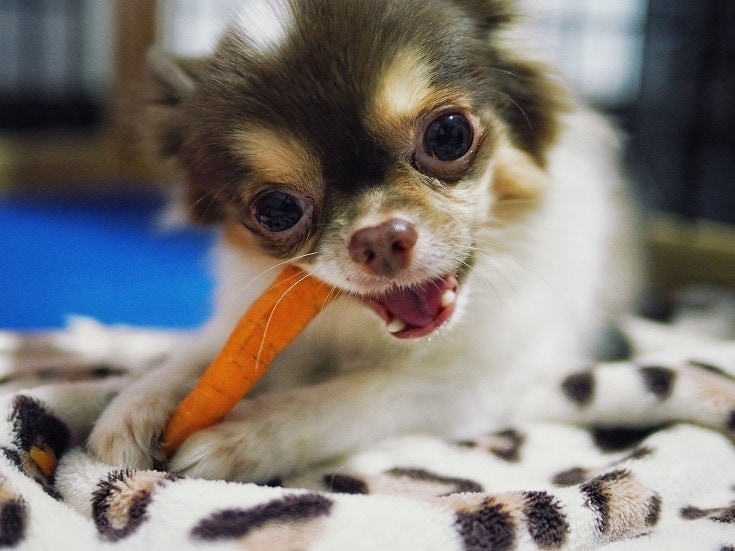
Carrots aren't just for Bugs Bunny — they're fantastic for your dog as well. It doesn't matter if you feed them to your pooch raw or cooked; they're full of vitamins, minerals, and fiber.
They don't have many calories either, so you can feed your dog as many carrots as they'll eat. Better still, they can help clean off plaque from your dog's teeth while they crunch on them. We do recommend peeling them first, though.
2. Chicken
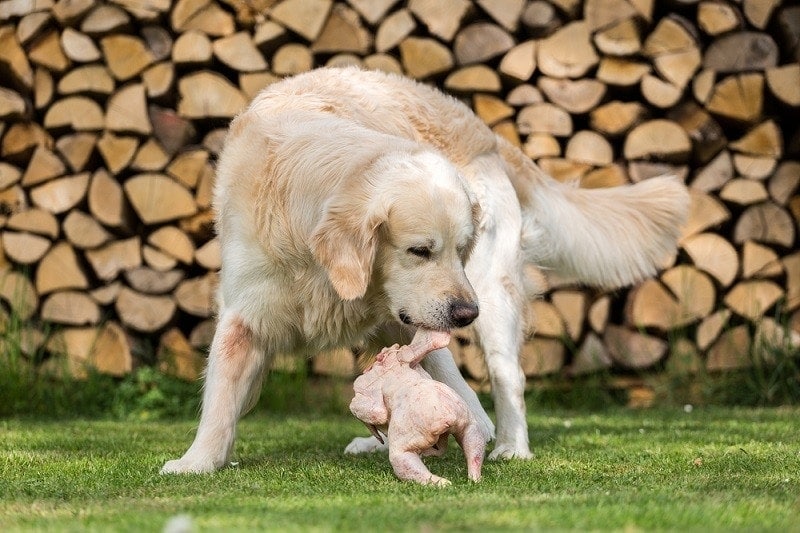
Chicken is fantastic for dogs, as it's a lean meat that's high in protein. Dogs love it too, so it makes a wonderful reward for when your pup has been an especially good dog.
If you're going to serve your dog chicken, though, it's best to serve it plain. It doesn't much matter how you prepare it, but it's best if you don't add any condiments or seasonings. Your dog won't miss them — and they certainly won't miss the salt and other additives inside them.
3. Apples
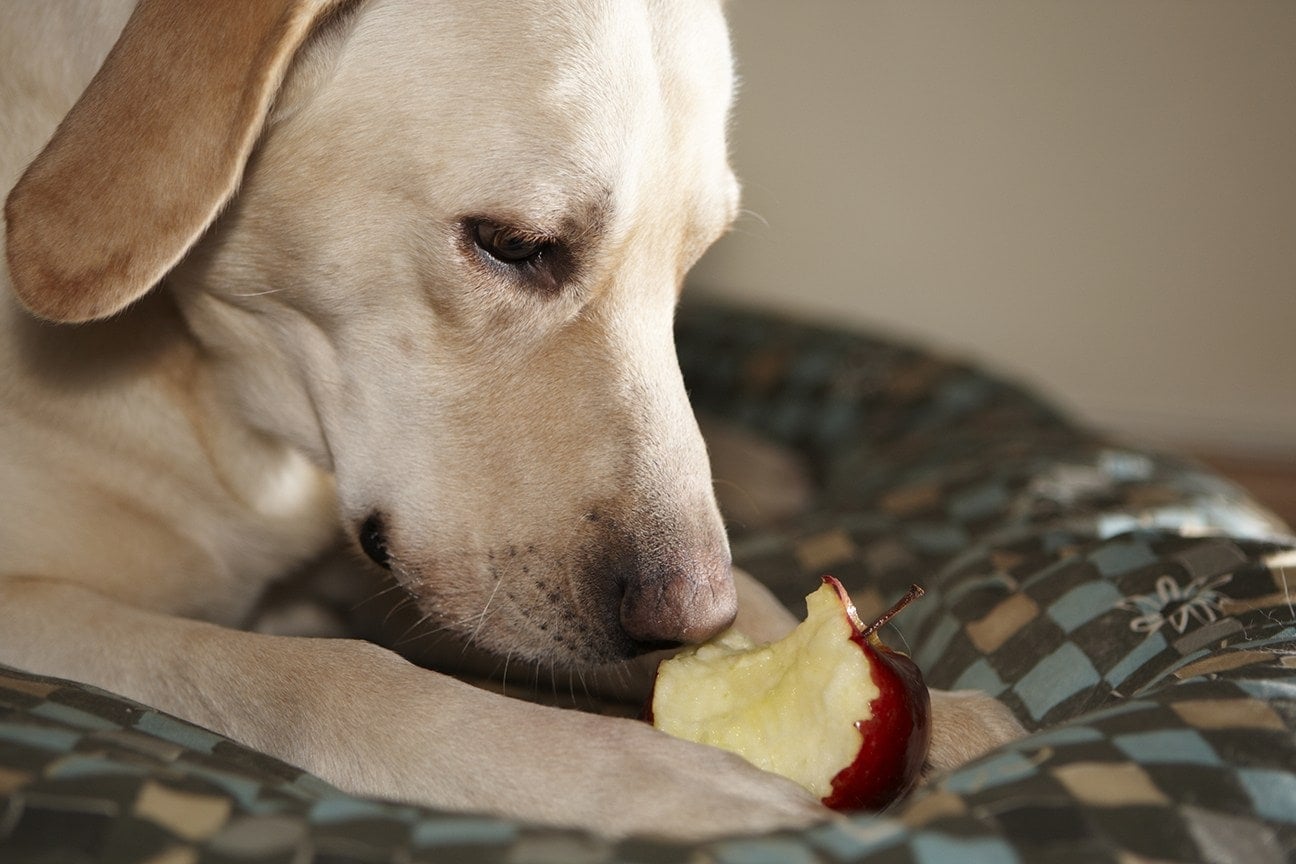
Full of vitamins A and C, apples are a wonderful treat for your pet. Many dogs love how sweet they are too, so you shouldn't have to work too hard to get your pooch to wolf them down.
Apples are a great source of fiber as well, so they can help keep your dog regular. Just don't feed them rotten apples, though, as those can lead to alcohol poisoning.
- Related Read: Top 10 Dog-Friendly Fruits for a Healthy Dog
4. Peanut Butter
It's incredibly rare to find a dog that doesn't love peanut butter. It makes a great training reward, or you can just smear some of it on a chew toy to keep your dog occupied for hours.
Luckily, peanut butter can be good for dogs — in moderation. It's full of protein and healthy fats, and it also has vitamins B and E. Buy the stuff that doesn't have added sugar, though, and make absolutely certain that it doesn't contain xylitol, which is toxic for pups.
Our Favorite Dog Deal Right Now
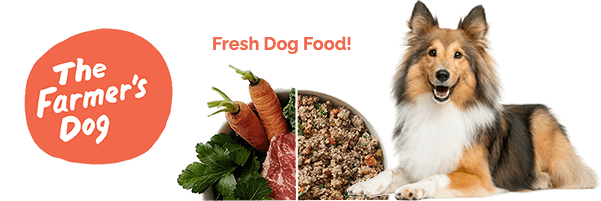
50% OFF at The Farmer's Dog Fresh Dog Food
+ Get FREE Shipping
5. Eggs
The next time that you get up and make yourself breakfast, consider frying up an egg for your dog as well. Eggs are full of protein, and they also contain virtually every important vitamin and mineral.
Don't give your pooch raw eggs, though, as they can carry salmonella. You can also mix up a fried egg with your dog's kibble to entice a picky dog.
6. Pork
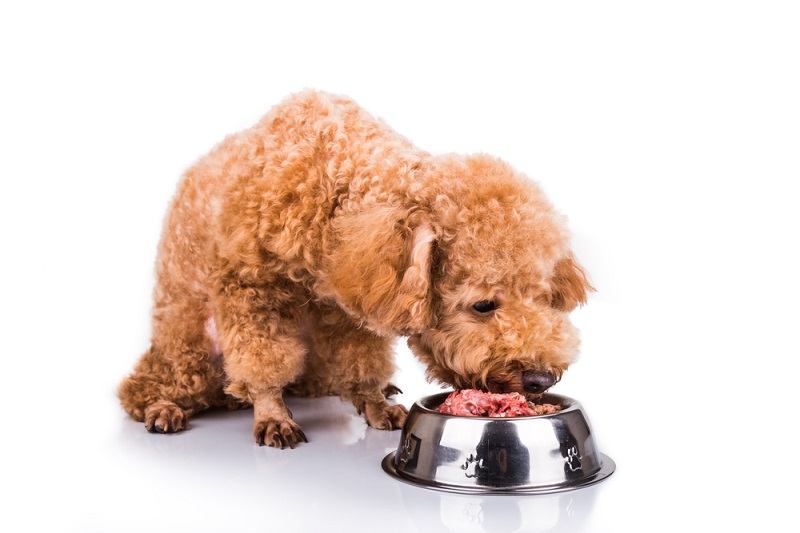
Just like chicken, pork is full of protein, so it's great for helping your dog build lean muscle. However, it's a fatty meat, so only serve it to your pet in moderation, as it can cause inflammation or pancreatitis in large quantities.
Don't salt your pork before you serve it, and don't give your pup bacon or processed ham, as those are both full of sodium.
7. Salmon
Cooked salmon is one of the best foods that a dog (or a person) can eat. It's lean, full of protein, and stuffed to the gills with omega fatty acids. These antioxidants do everything from fighting inflammation to improving skin quality.
Never give your dog raw fish, though. Raw salmon may contain a parasite that causes salmon poisoning disease, which can kill your pooch.
8. Blueberries
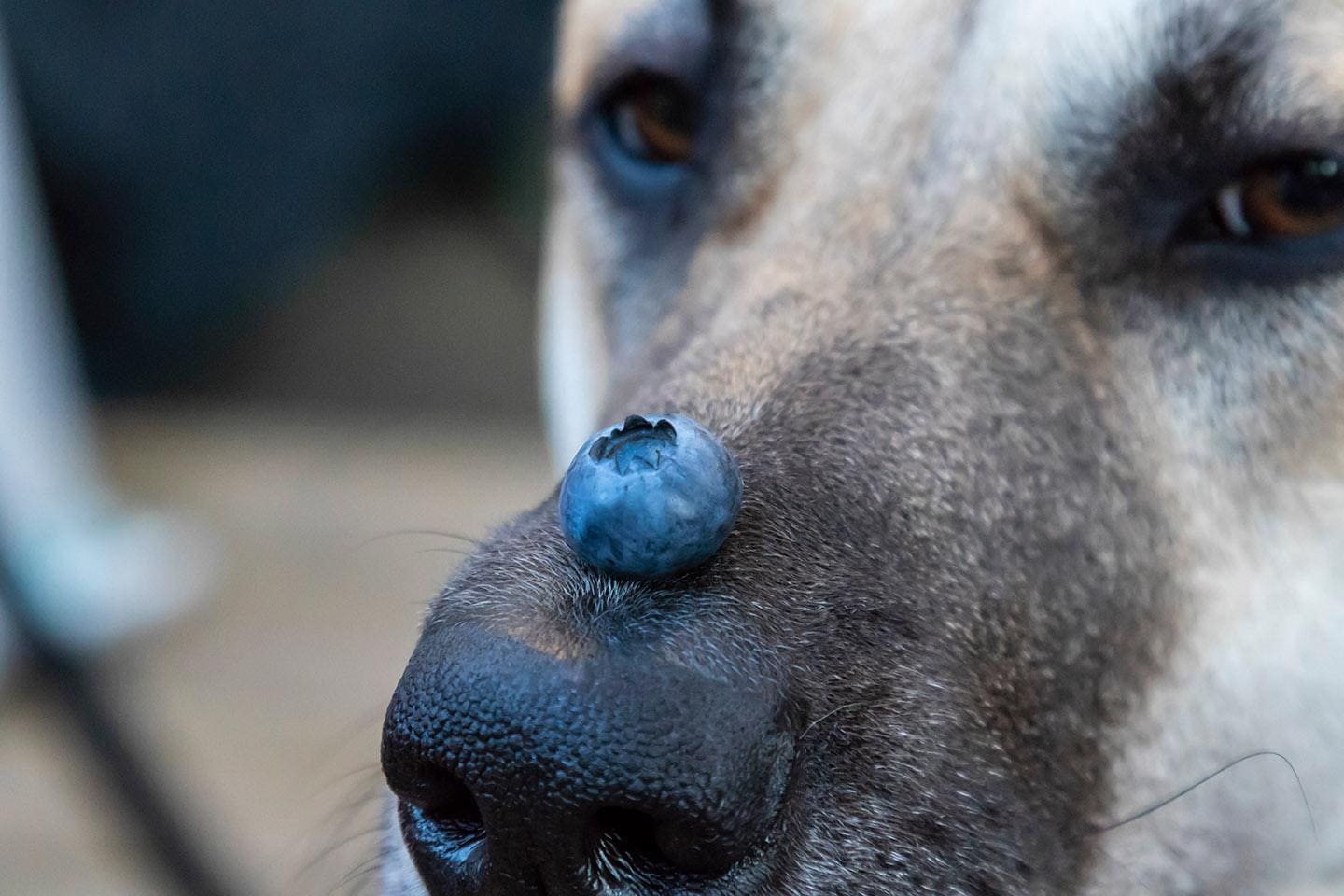
Blueberries are considered a superfood due to all the vitamins and antioxidants inside them, and they're also packed with fiber. If you can convince your pup to eat them, you should feed them as many as they'll take.
They're especially good for senior dogs, as they can improve all manner of age-related conditions.
9. Cucumbers
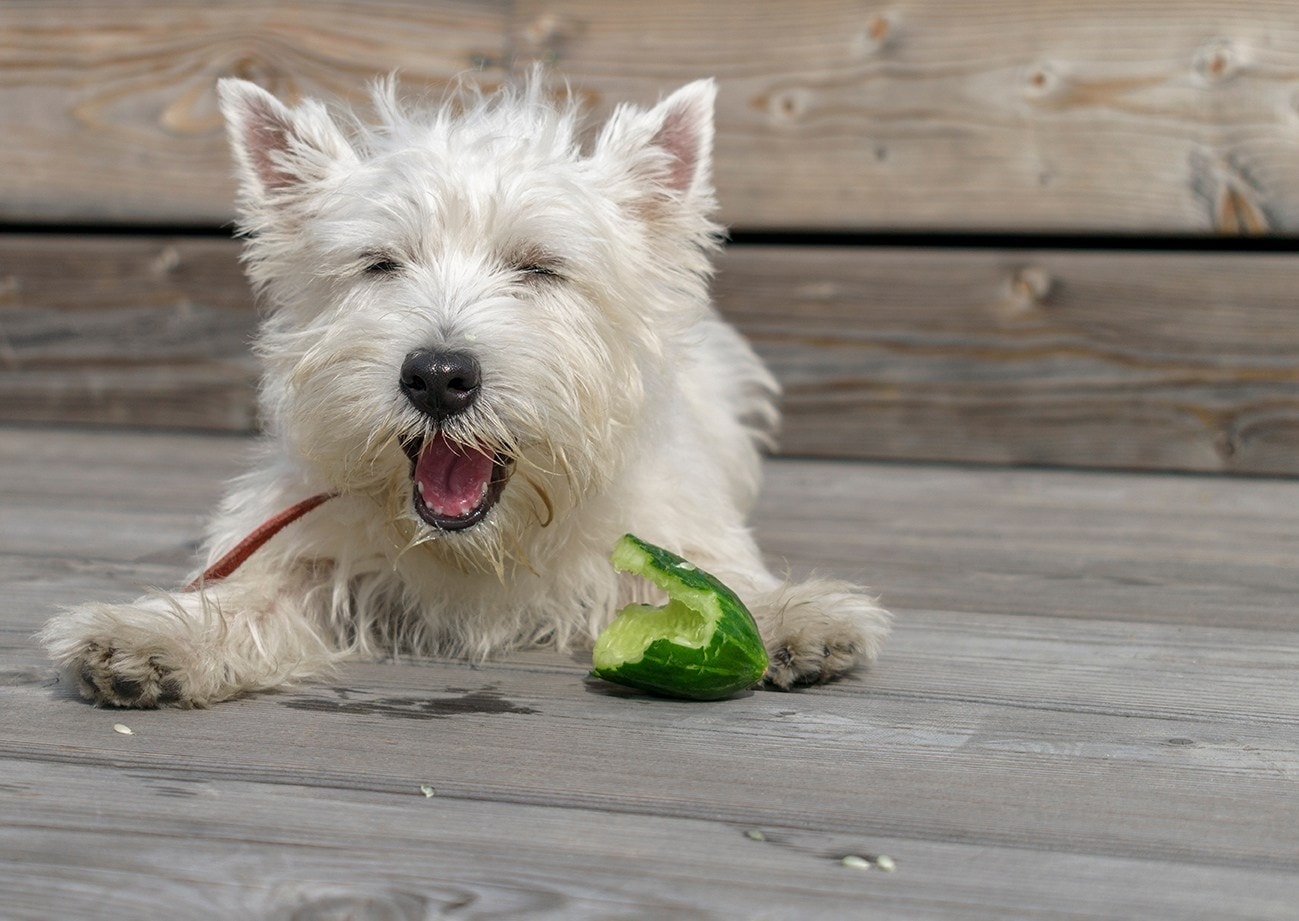
Not every dog will eat a cucumber, but if yours will, it makes a great, low-calorie treat or reward for dogs that need to lose a little weight, as they're mostly water. You can feed your pup quite a few without any adverse effects on their waistline.
They have their fair share of vitamins and minerals too. They're especially high in vitamin K, which can help treat bleeding problems in dogs.
10. Watermelon
If you want a sweet treat for your pup, watermelon is a good choice. Since it's so full of moisture, it's fantastic for dehydrated dogs. It also has vitamins A, C, and B-6.
Don't give them the seeds, though, as those can cause an intestinal blockage. Also, remove the rinds first; while they're not toxic, they can cause an upset stomach, giving you quite the mess to clean up.
11. Green Beans
Green beans are packed with calcium, iron, and vitamin K. You can give them to your pooch cooked or raw, and many dogs will gobble them right up.
Serve them to your pup plain and unsalted, and it's best if you cut them up first so your dog won't choke on them.
12. Turkey
Much like chicken, cooked turkey is safe and healthy for dogs. It's high in protein and is excellent for your pet. That's why it's included in so many kibbles.
Don't give your dog deli meat, however, as it's loaded with sodium. Also, if the turkey has any fat on it, cut it off first, as that can cause pancreatitis in large quantities.
13. White Rice
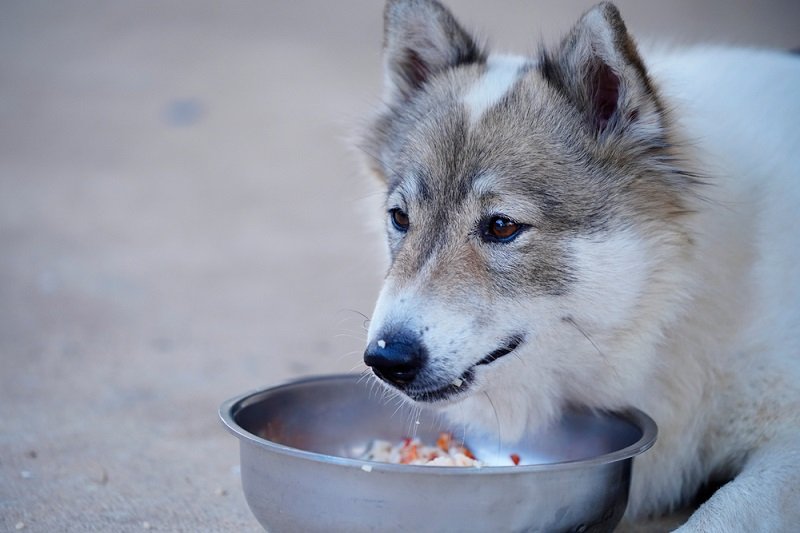
White rice doesn't necessarily have much in the way of nutrients for your dog, but it's extremely easy for dogs to digest. As a result, it's often prescribed for animals with upset stomachs, especially when paired with plain, boiled chicken.
It has a fair amount of sugar, though, so you should only serve it in moderation to dogs with diabetes.
14. Dairy

You have to give it to them in moderation, but a little bit of dairy is fine for your dog to eat — assuming that they're not lactose intolerant, of course. Whether it's milk, cheese, or yogurt, you can give it to your pup as a treat every now and then.
Yogurt is especially good, as it's full of probiotics that are wonderful for your dog's digestive tract. You can even freeze it and use it as a treat on a hot day.
- Related Read: 9 Health Benefits of Probiotics for Dogs – Based on Science
15. Bananas
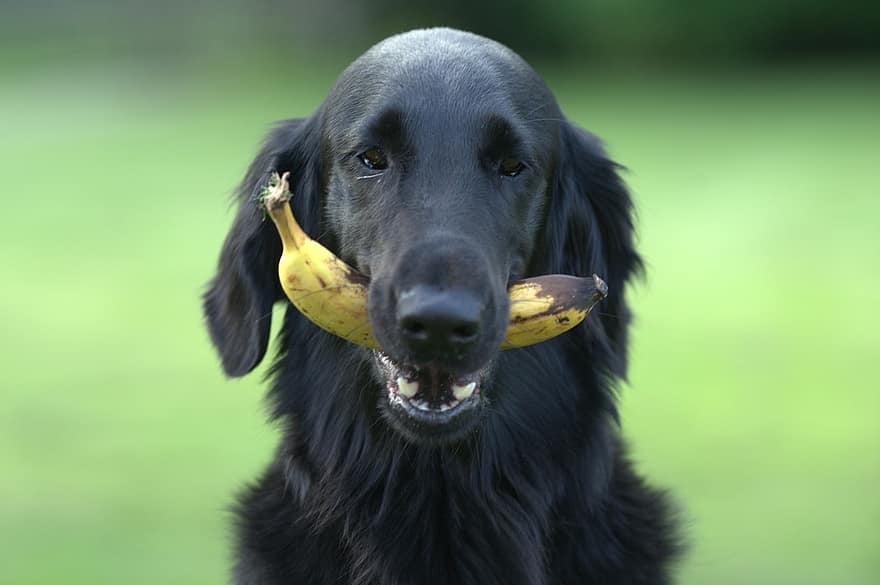
Bananas are packed with magnesium, which is good for a dog's bone health. They're also full of sugar, so you don't want to give your dog too many. They're also full of potassium, biotin, and fiber, all of which are necessary for your dog's health.
16. Asparagus
It's a rare dog indeed that will accept asparagus as a treat, but if you can convince your pup to try this stinky vegetable, they'll enjoy tons of fiber as a result. Be sure to cook it first, though, as raw asparagus can wreak havoc on a dog's digestive tract.
17. Spinach
Whether cooked or raw, spinach is full of iron, vitamin K, and a variety of antioxidants. It's incredibly healthy for both you and your pup.
It's unlikely that your dog will eat spinach on its own, but you may have more luck if you mix cooked spinach in with their kibble. It's worth a shot, anyway.
18. Pumpkin
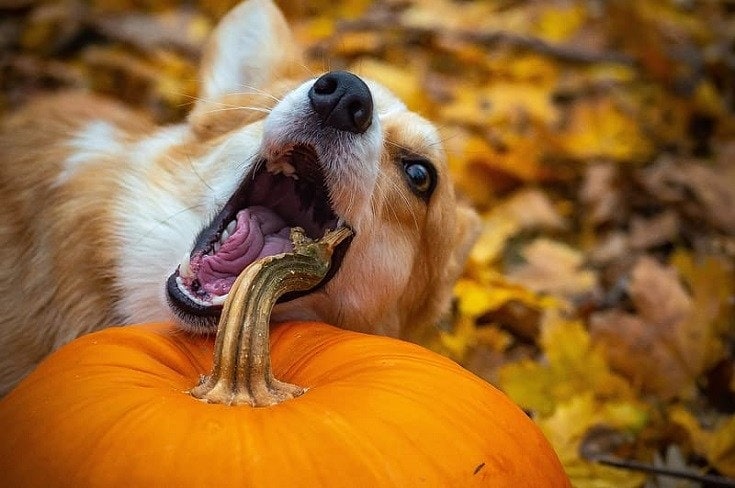
If your dog is ever backed up, adding pumpkin to their diet could clear things up in a big way. It's full of fiber and adds heft to their bowel movements, making them both more regular and easier to clean up (and possibly orange in color).
19. Plain Popcorn
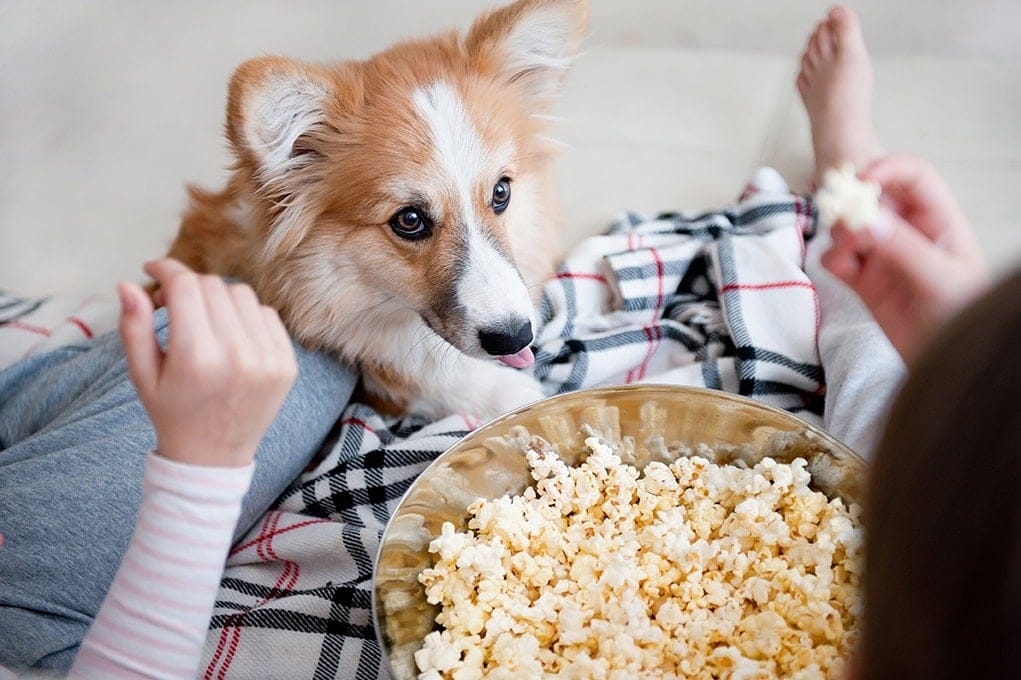
No, your dog can't have the good stuff, so don't offer them anything that's coated in salt, oil, and butter. However, plain popcorn is full of zinc, magnesium, and phosphorous, all of which are important parts of any dog's diet.
Be sure they don't get any kernels, though, as those can crack teeth and cause intestinal blockages. Put the bag safely out of reach too, as many dogs can choke themselves trying to eat it.
20. Sweet Potato
It seems like sweet potato is in just about every high-end dog food these days and for good reason: It's packed with fiber, vitamin C, and potassium. It's used in place of grains in many kibbles, so it should help keep your dog full without causing digestive issues.
21. Green Peas
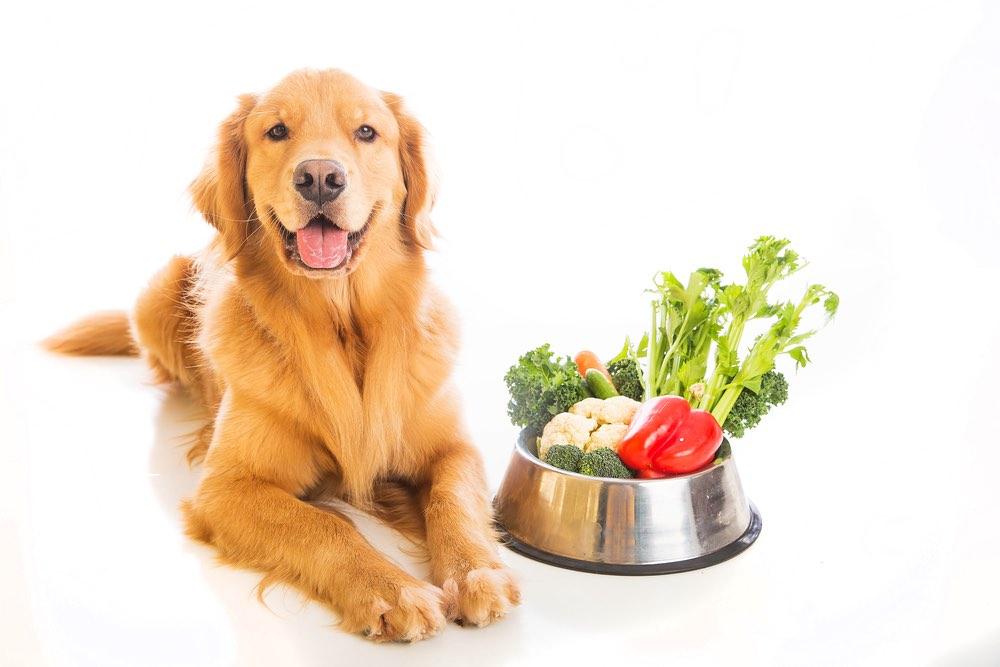
Peas are excellent for dogs, as they have tons of A and B vitamins, as well as zinc, iron, and potassium. They're also surprisingly high in protein, although dogs don't process plant protein as well as animal protein.
22. Celery
Many people claim that celery is nutritionally useless — but it is safe for your dog to eat.
23. Cooked Potatoes
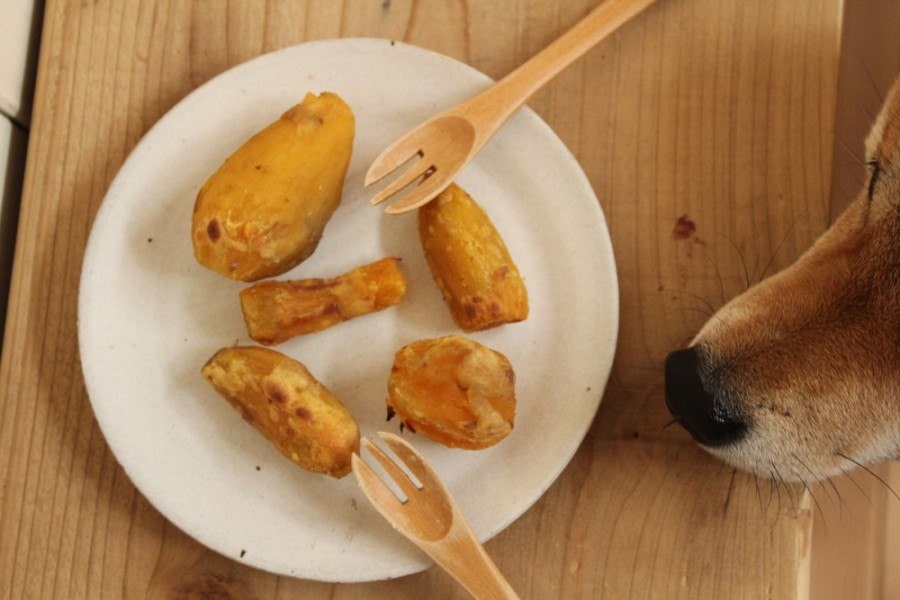
Don't ever feed your dog raw or green potatoes, as those can kill them. Cooked potatoes, on the other hand, have plenty of vitamins C and B6, as well as iron. You should remove the skins before serving, though.
24. Corn
Corn gets a bad rap because it's used as a cheap filler in many commercial dog foods. As an occasional additive to a healthy kibble, though, corn can give your dog protein, linoleic acid, and fiber. Just feed it sparingly.
25. Oatmeal

Oatmeal is gentle on a dog's stomach, making it a good option for a dog with tummy troubles. It's also a good substitute for wheat in gluten-intolerant pups.
26. Cashews
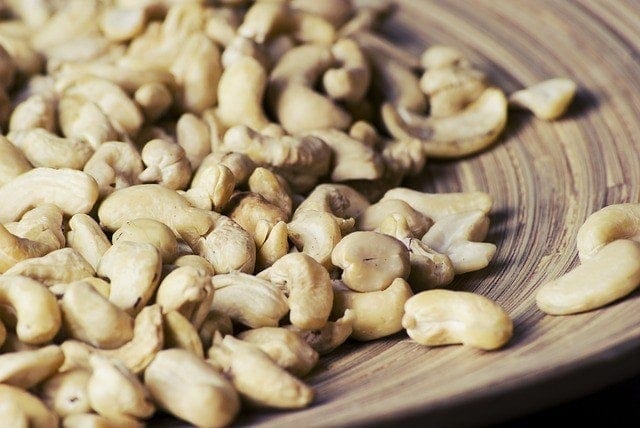
Cashews contain calcium, protein, magnesium, and a handful of important antioxidants. Many dogs love them, but you should only feed them sparingly, as they're full of fat (not to mention the fact that they're expensive).
27. Shrimp

Shrimp is good because it's low in fat and calories yet high in protein. It also has phosphorous and vitamin B-12. On the downside, though, it's loaded with cholesterol, so don't give your dog too much. Also, remove the tails first.
28. Soy

Soy is another ingredient that's often demonized because it's used in cheap, low-quality kibbles. However, it's safe for dogs to eat — but many dogs don't tolerate it well, so be sure to monitor your pup after feeding it to them.
29. Ice Cream

Most ice cream is safe for dogs to eat, but that doesn't mean they should. It's extremely high in fat and sugar, so don't give your pooch more than a taste. Also, check the ingredients to make sure there isn't anything toxic in there — many diet desserts use xylitol as a sweetener.
30. Bread
Unless it has raisins or other toxic ingredients in it, bread is perfectly safe for dogs to consume. It's full of empty carbs, though, and it doesn't offer much in the way of nutritional benefit.
There's one time that bread can come in handy, however. If your dog has eaten something that they shouldn't — especially something that could puncture their digestive tract — feeding them several slices of bread could provide a protective barrier against puncture wounds until they pass it.
31. Honey

Honey is great for allergy-prone dogs like Pit Bulls, as it helps animals build up a resistance to allergens. It also contains nearly every vitamin on the list, as well as calcium, copper, and potassium. Don't give your dog more than a spoonful or two, though, as it's full of sugar.
Also, don't feed honey to puppies or animals with compromised immune systems.
32. Goat's Milk
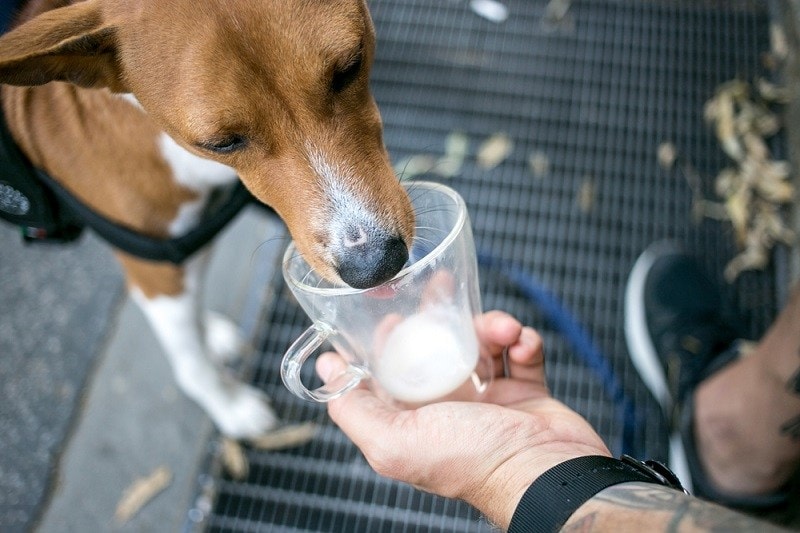
Goat's milk has all the vitamins, minerals, and other good stuff that cow's milk does, but it's much easier for dogs to digest. You should still only serve it in moderation, but it's a better choice for pups than traditional moo juice.
Our Favorite Dog Deal Right Now

50% OFF at The Farmer's Dog Fresh Dog Food
+ Get FREE Shipping
33. Zucchini
Whether cooked or raw, zucchini is a high-fiber, low-calorie treat for your pup. Many dogs will turn their noses up at it, but if yours will eat it, feel free to use it as a treat every now and then.
34. Peaches
Peaches are jam-packed with vitamin A, making them great for skin and coat health. They also contain a fair amount of fiber — and a great deal of sugar, so serve them sparingly. Don't let your dog get ahold of the pit, either, as it can cause a life-threatening intestinal blockage.
35. Blackberries

Another so-called superfood, blackberries have just about every vitamin and mineral that you can think of, as well as an impressive array of antioxidants. They're also full of fiber. Don't give your dog more than a few per day, though.
36. Coconut
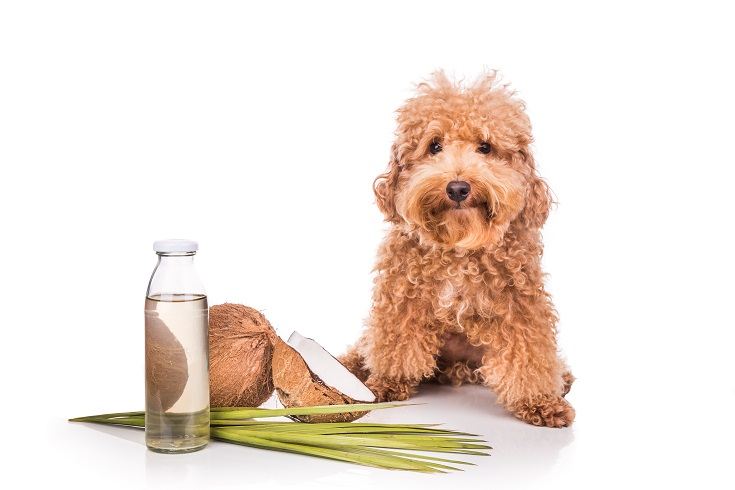
Coconut and coconut oil have received a great deal of press in recent years for being fantastic for everything from fighting aging to benefiting skin and fur. Many of those health claims haven't been proven yet, but coconut meat and oil are both safe for dogs. Don't give them more than a tiny bit, though, as it's incredibly high in fat.
37. Mango
If used as an occasional reward, mangoes can be excellent for canines. They're full of fiber, and they have important vitamins and minerals. Just peel them first and be sure to remove the pit.
38. Mushrooms

Any store-bought mushroom should be safe for your dog to consume, although they may not see much benefit from it. Make sure it's not combined with troublesome ingredients like garlic or onions, though, and never let your pup eat a mushroom that they've found growing in the wild.
39. Cherries

Pitted cherries are another food that dogs can eat, but there's not much reason to let them do so. Cherry pits are extremely toxic, though, as they contain cyanide (plus, they're choking hazards).
40. Oranges

Many dogs like the taste of oranges, but that's because they're high in sugar. As a result, you should limit the amount that you feed your pup. Still, they have vitamins and minerals (especially vitamin C) and are low in calories, so they make great treats for overweight dogs.
 It's Probably Best to Limit Your Dog to Their Own Food
It's Probably Best to Limit Your Dog to Their Own Food
While all the foods on this list are safe to give to your dog in some amount, that doesn't mean you should give your dog any of them.
The fact is that your pup's kibble is already designed to give your pooch all the nutritional support they need, and human food often does nothing other than expand your dog's waistline and cause digestive issues.
Of course, saying no to those puppy dog eyes is easier said than done, so we won't judge you too harshly for sharing your dinner — provided all the food on your plate is listed above.
We truly hope that this article helped you determine what human foods dogs can eat!
- Related read: Can Humans Eat Dog Food? What You Need to Know!
Featured image credit: fancycrave1, Pixabay
Source: https://www.hepper.com/human-foods-that-dogs-can-safely-eat/
0 Response to "Human Food That You Can Feed Your Dog"
Post a Comment